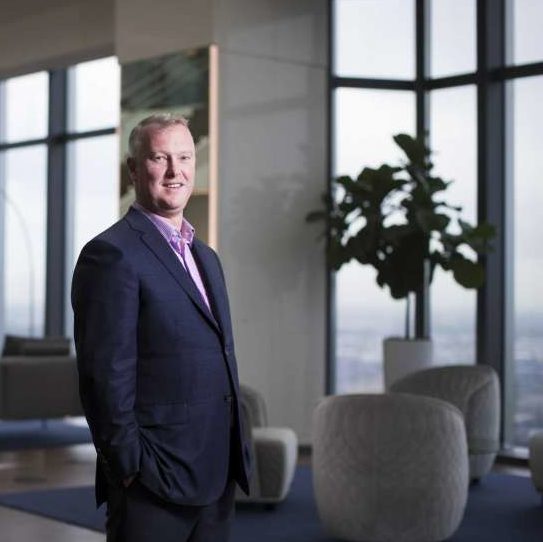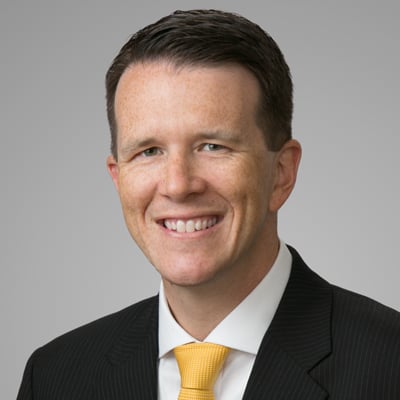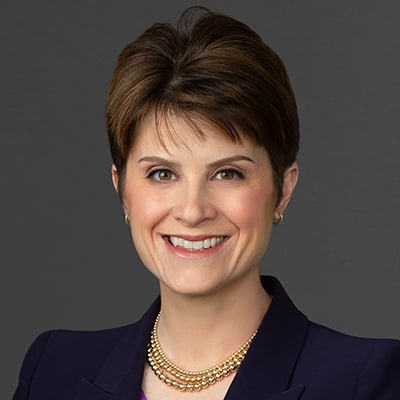The Houston rental office space was cramped. Six deal lawyers — two crowded into each small office — wondered what was going to happen next. Their bosses at a 1,600-lawyer corporate law megafirm sent them from Chicago and New York to possibly launch the global firm’s first branch operation in Texas.
On the other side of paper-thin walls, a divorce lawyer was yelling at opposing counsel while his clients could be heard crying. The smell of chorizo filled the office from Lone Star Taco, two floors below.

“We were all waiting to see if Andy was going to walk across the street to join the firm,” said William Benitez, who had flown from Chicago to Houston that morning to help open the office. “If Andy had decided not to join, I have no idea what would have happened next. We just didn’t know. It was not clear that he would.”
About noon, Andy resigned from the elite partnership at Wall Street corporate law powerhouse Simpson Thacher and made the walk across the street, where he met the six attorneys awaiting his arrival above the downtown Houston taco shop. The news of his arrival was immediately transmitted to Chicago and New York, where a press release was dispatched: April 22, 2014: Kirkland & Ellis Opens Houston Office and Expands Corporate Practice with Hire of M&A Attorney Andrew T. Calder.
“A lot of people told me that I was crazy for taking such a big risk by leaving such a great law firm as Simpson Thacher — and it is a great law firm,” Calder told The Texas Lawbook in an exclusive interview. “I was hoping that clients would follow me to Kirkland, but you are never quite sure.”
Clients did follow. In fact, by the end of the first day, the Kirkland team in Houston, which included Benitez, John Pitts, Rhett Van Syoc and Kyle Watson, had 30 private equity deals to handle.

“From the moment he walked across the street and in the door, Andy has been a force of nature,” Benitez said. “From Day 1, we had more deals than we had people. I sent people to Best Buy to buy printers.”
Van Syoc agreed that the first three weeks in the rental space were hectic and uncertain.
“We were probably too young and too stupid to see the risks we were taking,” he said.
Will Bos, who joined the Kirkland team six weeks later in June 2014, added, “People scoffed at me and said we were crazy and didn’t think we would be successful.”
The 10-year Texas report card for Kirkland, a firm founded in Chicago in 1909, is packed with statistics making the argument that it is the most successful law office launch in Texas history. For example:
- From six lawyers in April 2014, Kirkland now has 414 attorneys in Houston, Dallas and Austin — tied for second biggest corporate law firm by lawyer headcount operating in Texas.
- In 2023, Kirkland hired 74 first-year lawyers for its Texas offices, nearly double any other law firm, and plans for an even larger class of 2024.
- Those 400-plus Texas attorneys generated $865 million in 2023 — $200 million more than any other law firm, according to new data collected by the Texas Lawbook 50. Kirkland passed Vinson & Elkins as the highest revenue-generating law firm in Texas in 2021.
- Texas Lawbook 50 data shows that Kirkland lawyers in Texas have generated $4.036 billion in revenues during the past decade.
- Since 2015, the firm’s Texas lawyers have led or co-led 930 mergers, acquisitions and joint ventures with a combined deal value of $608.1 billion, according to the Lawbook’s exclusive Corporate Deal Tracker database.
- Kirkland opened its Dallas office in 2018 with three lawyers — Michael Considine from Jones Day, Kevin Crews from Weil Gotshal and Thomas Laughlin from V&E — and has 123 lawyers.
- Kirkland opened an office in Austin in 2021, which now has 81 attorneys.
“I initially thought we could reach 100 lawyers in Houston,” Calder said. “We had no grand plans for Dallas or Austin. The idea of having 400 lawyers was not even part of an imagination in 2014.”
The extraordinary success has made Kirkland a target, as Texas competitors call the firm the “Evil Empire” and gloat when they steal away a Kirkland partner or criticize the firm for allegedly requiring associates to bill 2,700 hours a year. Competitors complain that Kirkland created turmoil in the market by offering big bonuses to midlevel corporate transactional associates or guaranteed multiyear contracts to lure away partners.
“There have been so many stories and myths about Kirkland that just are not true,” Calder said.

Adds Pitts, who joined from Simpson Thacher the first day with Calder: “If there are sharp elbows here at Kirkland, it is when we do not collaborate in our work.”
Rob Walters, a retired partner at Gibson, Dunn & Crutcher, said many of the complaints about Kirkland are “jealousy, plain and simple.”
“What Andy and Kirkland have done in Texas is nothing short of extraordinary,” Walters said in an interview last year. “They built a business model that is nearly recession-proof, combining private equity, M&A, corporate restructuring and tax. We all should be a little envious at Kirkland’s success.”
Walters should know, as he grew Gibson Dunn’s Texas operations from a sleepy 25 attorneys a dozen years ago to more than 180 lawyers today.
“Other firm leaders should study and learn how Kirkland did it,” he said. “Andy clearly had a vision and Kirkland gave him the resources to make it a reality.”
Andy Calder — ‘Never Worked with Anyone Like Him in My Life’
Born and raised just south of Edinburgh, Scotland, Calder grew up with visions of being a criminal defense lawyer. His mother was a college administrator, and his dad was a social worker.
After finishing the Oxford Institute of Legal Practice in 2002, he became a trainee solicitor at Herbert Smith for two years. The firm required him to spend six months in various practice areas. His time with Herbert Smith’s transaction practice opened his eyes.
In 2004, Simpson Thacher hired Calder as an associate in its M&A practice in New York. One of his first big deals involving a Texas company came in 2007 when he played a key role representing private equity firms KKR and TPG in their $45 billion leveraged buyout of TXU Energy.
Four years later, Simpson Thacher promoted Calder to partner and relocated him to its newly opened Houston office.
In 2014, Kirkland Chairman Jeffrey Hammes approached Calder about joining the firm and launching its Houston office.
“Jeff said he wanted to build an energy practice that was No. 1 or No. 2,” Calder recalls. “I asked him who else he wanted to talk to, and he said if he knew that, he wouldn’t be talking with me.”
Calder said he felt loyal to Simpson Thacher and understood the risks of leaving such a great firm, but he said the opportunity seemed too incredible.
“Kirkland gave us license to building something special in Houston,” Calder said. “Kirkland doesn’t just dip its toe in the water. They jump in. The firm gave me everything I asked for and more.”
“I kept thinking Kirkland would tell me to slow down,” he said. “Instead, they kept telling me to think bigger.”

Calder said many competitors made him the face of Kirkland’s success, but he said the lawyers who joined early — Pitts from Simpson Thacher, Van Syoc from a client, Benitez from Kirkland in Chicago and Bos from Vinson & Elkins — were critical to the firm’s success.
Those partners, in turn, point back to Calder as the root of the success.
“Andy taught me how to be a lawyer,” Pitts said. “He’s a brilliant M&A lawyer and negotiator. As high as Andy’s standards are — and they are sky high — he is incredibly loyal to his partners.”
The hiring of Bos away from V&E in June 2014 and Sean Wheeler from Latham & Watkins in 2018 were transformational hires for Kirkland because they were great lawyers who came from established firms.
“Andy called me and asked if I wanted to join Kirkland’s new office, and I said, ‘Absolutely not.’ But Andy is very persuasive,” Bos said. “Andy is dynamic. He is lightning in a bottle. He is 24/7, nonstop. I’ve never worked with anyone like him in my life.”
Bos said he recognizes that it was “important to have someone from a legacy Texas firm with a traditional oil and gas practice to join the firm.”
Three months after Bos joined, fellow V&E partner Matt Pacey joined Kirkland.
“I had a great career at V&E, and I wasn’t looking to leave,” Pacey said. “The opportunity to build a new office is not presented to lawyers often. It was a tremendous risk at the time, but also a tremendous opportunity.”
April 2014 — Great Timing
Kirkland could not have selected a better month to launch its Houston office than April 2014.
The oil and gas M&A market was frothy and private equity — Kirkland’s bread and butter — was investing big bucks, especially in the Permian.
And then, only a week after Kirkland opened its new office in Houston, Dallas-based Energy Future Holdings filed for bankruptcy on April 29, 2014, and hired Kirkland to lead the restructuring.
While Kirkland had no bankruptcy lawyers in Texas, Calder and lawyers in Houston handled the corporate transactional work that stemmed from the restructuring, including the sale of Oncor. Little did Kirkland lawyers know at the time, but Oncor would be the M&A gift that just kept giving.

In August 2015, Calder and Kirkland led EFH’s $18 billion sale of Oncor to Hunt Consolidated. But that deal ran into trouble with regulators. So, in July 2016, Calder and Pitts again represented EFH in its second attempt to sell Oncor for $18 billion, but this time to Florida-based NextEra Energy. But the Texas Public Utility Commission also killed that deal, forcing EFH to turn to Berkshire Hathaway, also for $18 billion. But a month later, Sempra Energy made a better offer. The deal finally closed in March 2018. Court records show that Kirkland was paid about $300 million for its work on one of the most complex corporate restructurings in Texas history.
“Essentially, we sold Oncor four different times, which required us to pay Kirkland four separate times to handle a highly complex $18 billion sale,” former EFH General Counsel Andy Wright said in an interview in 2018. “To be honest, Kirkland got the M&A work because they had just hired Andy Calder. If Andy had not been there, we probably would have gone with another law firm.”
2016 — Litigation
In 2015, Yetter Coleman partner Anna Rotman met Calder at the gym working out. They shared the same trainer.
“I remember thinking it was bananas that this guy would leave Simpson Thacher to start a new office of a law firm,” Rotman said in an interview. “I met with Andy and I offered to be a referral source if their lawyers needed someone to handle litigation. Andy said he didn’t think Kirkland would be doing a lot of referrals.”

That was when Calder asked Rotman to consider joining Kirkland.
“My kids were three and five, and I had a sense that I would regret not doing it,” she said. “I think a lot of people pooh-poohed us because we were young and didn’t think we could do it. I think they underestimated hustle and hard work.”
“Kirkland allows — actually encourages — us to be aggressive,” Rotman said. “People send emails here at 11 p.m. and everyone responds by 11:30 p.m., and that is not normal at most firms.”
Following Rotman’s hiring, the firm added Taj Clayton from Winston & Strawn, Jeremy Fielding from Lynn Pinker, and Erin Nealy Cox, who was the U.S. attorney for the Northern District of Texas.
Rotman is one of the lead lawyers for TexGen Power in the massive Winter Storm Uri litigation.
The Next 10 Years
The scary part for competitors is that the group that started Kirkland in Texas a decade ago is still only in their 40s. Calder is 45.
“I called clients and asked them who the best CapM and M&A partners are in the Texas market,” Calder said. “I tried to hire people who were 35 to 45 years old because they were seasoned lawyers who could get business but still young enough to be hungry and work hard.”
The best thing about this market is that there is a ton of young talent,” he said. “We are more motivated today to be successful than ever before. And I think there is still plenty of room for us to grow even more in Texas.”
Adds Pitts, “I never thought that being a lawyer could be so much better than what it used to. I get up every day energized.”
